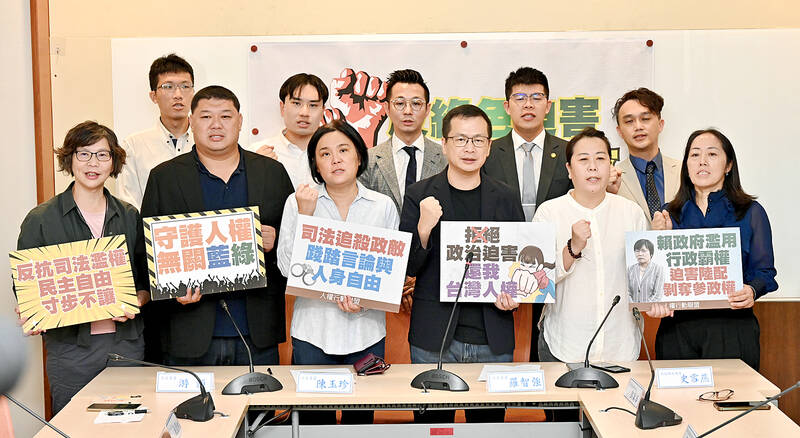President William Lai’s (賴清德) government is rife with human rights violations and its abuses of power need to be reined in, Chinese Nationalist Party (KMT) Legislator Lo Chih-chiang (羅智強) said on Wednesday at the founding of the Anti-Green Human Rights Oppression Action Alliance.
The alliance would provide legal consultation and assistance to people who are “victims of Democratic Progression Party (DPP) oppression,” Lo said, citing the situations of former Taipei mayor Ko Wen-je (柯文哲), Huang Lu Chin-ru (黃呂錦茹), former head of the KMT’s Taipei chapter, and Chinese spouses as examples of abuse.
Former Taiwan People’s Party’s chairman Ko, who ran against Lai in last year’s presidential election, is facing charges of alleged corruption dating to his time as Taipei mayor.

Photo: George Tsorng, Taipei Times
Huang has been released on bail amid an investigation into alleged forgery of signatures in a recall campaign targeting two DPP lawmakers.
Lo said that identity issues regarding Chinese spouses were typically handled according to the Act Governing Relations Between the People of the Taiwan Area and the Mainland Area (臺灣地區與大陸地區人民關係條例).
However, the Lai administration has cited the Nationality Act (國籍法) as the legal basis for creating difficulties for them, he said.
The organization was founded to prevent that type of abuse, he said.
The crux of the question is whether Article 20 of the Nationality Act has the power to deny the right of Chinese spouses who have Taiwanese IDs to participate in politics, said Lee Yue-yang (李岳洋), a lawyer.
In terms of legal governance, the two sides of the Taiwan Strait are defined as the “mainland area” and the “Taiwan area,” not two separate states, meaning there is no issue of dual citizenship, Lee said.
Alliance spokesman Tang Ta-chun (唐大鈞) said that Chinese spouses cannot renounce their Chinese citizenship, as both sides of the Strait refuse to acknowledge the sovereignty of the other.
As a country governed by the rule of law, the Republic of China is obliged to provide Chinese spouses who have Taiwanese IDs the same rights and benefits as other Taiwanese, Tang said.
KMT Legislator You Hao (游顥) said that Shi Xueyan (史雪燕) and Deng Wanhua (鄧萬華) had ROC IDs through legal channels and their election wins were in accordance with the law.
Shi won a Nantou County councilor seat, while Teng won an election to be warden of Hualien County’s Syuetian Village (學田). Both had their wins nullified due to lack of evidence that they had revoked their Chinese citizenship.
If no one does nothing now, human rights violations would continue, You said.
KMT Legislator Chen Yu-jen (陳玉珍) said the government’s interpretation of the law was arbitrary and trampled on the human rights of Chinese spouses.

Taiwanese scientists have engineered plants that can capture about 50 percent more carbon dioxide and produce more than twice as many seeds as unmodified plants, a breakthrough they hope could one day help mitigate global warming and grow more food staples such as rice. If applied to major food crops, the new system could cut carbon emissions and raise yields “without additional equipment or labor costs,” Academia Sinica researcher and lead author the study Lu Kuan-jen (呂冠箴) said. Academia Sinica president James Liao (廖俊智) said that as humans emit 9.6 billion tonnes of carbon dioxide compared with the 220 billion tonnes absorbed

The Taipei Mass Rapid Transit (MRT) Wanda-Zhonghe Line is 81.7 percent complete, with public opening targeted for the end of 2027, New Taipei City Mayor Hou You-yi (侯友宜) said today. Surrounding roads are to be open to the public by the end of next year, Hou said during an inspection of construction progress. The 9.5km line, featuring nine underground stations and one depot, is expected to connect Chiang Kai-shek Memorial Hall Station to Chukuang Station in New Taipei City’s Jhonghe District (中和). All 18 tunnels for the line are complete, while the main structures of the stations and depot are mostly finished, he

Taipei is to implement widespread road closures around Taipei 101 on Friday to make way for large crowds during the Double Ten National Day celebration, the Taipei Department of Transportation said. A four-minute fireworks display is to be launched from the skyscraper, along with a performance by 500 drones flying in formation above the nearby Nanshan A21 site, starting at 10pm. Vehicle restrictions would occur in phases, they said. From 5pm to 9pm, inner lanes of Songshou Road between Taipei City Hall and Taipei 101 are to be closed, with only the outer lanes remaining open. Between 9pm and 9:40pm, the section is

China’s plan to deploy a new hypersonic ballistic missile at a Chinese People’s Liberation Army Rocket Force (PLARF) base near Taiwan likely targets US airbases and ships in the western Pacific, but it would also present new threats to Taiwan, defense experts said. The New York Times — citing a US Department of Defense report from last year on China’s military power — on Monday reported in an article titled “The missiles threatening Taiwan” that China has stockpiled 3,500 missiles, 1.5 times more than four years earlier. Although it is unclear how many of those missiles were targeting Taiwan, the newspaper reported